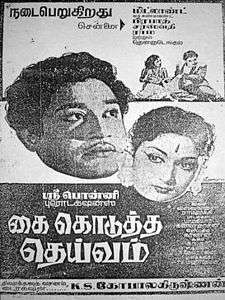Kai Koduttha Dheivam
| Kai Koduttha Deivam | |
|---|---|
 | |
| Directed by | K. S. Gopalakrishnan |
| Produced by | M. S. Velappan |
| Written by |
T. S. Mahadevan, K. S. Gopalakrishnan |
| Starring |
Sivaji Ganesan S. S. Rajendran Savithri K. R. Vijaya |
| Music by | Viswanathan Ramamoorthy |
| Cinematography | M. Karnan |
| Distributed by | Sri Ponni Productions |
Release dates |
|
Running time | 164 minutes |
| Language | Tamil |
Kai Koduttha Deivam (Tamil: கை கொடுத்த தெய்வம், English: God Who Offered His Hand) is a Tamil language film starring Sivaji Ganesan, S. S. Rajendran, Savithri and K. R. Vijaya in the lead roles. The film was released on 18 July 1964. The film was remade in Hindi as Pyar Ki Kahani (1971) with Amitabh Bachchan.[2]
Plot
Relates the true meaning of friendship between two youths, Raghu (Sivaji Ganesan) and Ravi (S. S. Rajendran). Ravi leaves his hometown in Tamil Nadu and comes to Amritsar. Here, Raghu finds him in an unconscious state and takes him home. Raghu sacrifices his managerial post and gives it to Ravi. Ravi, however, does not reveal his true identity and the real reason for leaving home. As per his parents wish, Ragu sees a girl to marry. However, when Ravi sees the photograph of the girl, he asks Rghu not to marry her. A shocking truth about the girl is then revealed to Raghu.
Cast
- Sivaji Ganesan as Raghu
- S. S. Rajendran as Ravi
- Savithri as Kokila
- K. R. Vijaya as Latha
- M. R. Radha as Varadan
- S. V. Ranga Rao as Mahadevan
- Chittor V. Nagaiah as Latha's father
- Pushpalatha as Sakuntala
- S. V. Sahasranamam as Mahadevan's lawyer
Crew
- Producer: M. S. Velappan
- Production Company: Sri Ponni Productions
- Director: K. S. Gopalakrishnan
- Music: Viswanathan Ramamoorthy
- Lyrics: Mahakavi Bharathiyar & Kannadasan
- Story: K. S. Gopalakrishnan
- Screenplay: K. S. Gopalakrishnan
- Dialogues: K.S.Gopalakrishnan
- Art Direction: Ganga
- Editing: R. Devarajan
- Choreography: B. Jayaraman
- Cinematography: M. Karnan
- Stunt: None
- Dance: None
Soundtrack
The soundtrack is composed by Viswanathan Ramamoorthy while the lyrics were written by Mahakavi Bharathiyar & Kannadasan. The songs "Aayirathil Oruthi" and "Sidhunadhi" were well received. Telugu portions of song "Sindhunadhi" was performed by Telugu composer J. V. Raghavulu.[3] Noted composer James Vasanthan said that he won first prize in his childhood by rendering this song in a competition and that acknowledgement gave him enough confidence to take music seriously.[4] Dhananjayan wrote that the film is "known for superhit songs [..] which helped tremendously in enhancing film's appeal".[5]
- Ayiratthil oruthiyammA nI by T. M. Soundararajan
- sindhu nadhiyin misai by T. M. Soundararajan, L. R. Easwari & J. V. Raghavulu
- mangala melam pongi mulanga by P.Sushila.
Awards
- The film won National Film Award for Best Feature Film in Tamil - President's Silver Medal in 1965.
- The film was one of the 100 days film of Sivaji Ganesan.
References
- ↑ Dhananjayan 2014, p. 176.
- ↑ "Its flashback time for Amitabh Bachchan". The Indian Express. 5 May 2015. Retrieved 12 September 2015.
- ↑ S. R. Ashok Kumar. "Audio Beat: En Oviya — Happy listening!". The Hindu. Retrieved 12 September 2015.
- ↑ T. Saravanan. "On a melody trail". The Hindu. Retrieved 12 September 2015.
- ↑ Dhananjayan 2014, p. 177.
Bibliography
- Dhananjayan, G. (2014). Pride of Tamil Cinema: 1931 to 2013. Blue Ocean Publishers.
External links
| ||||||